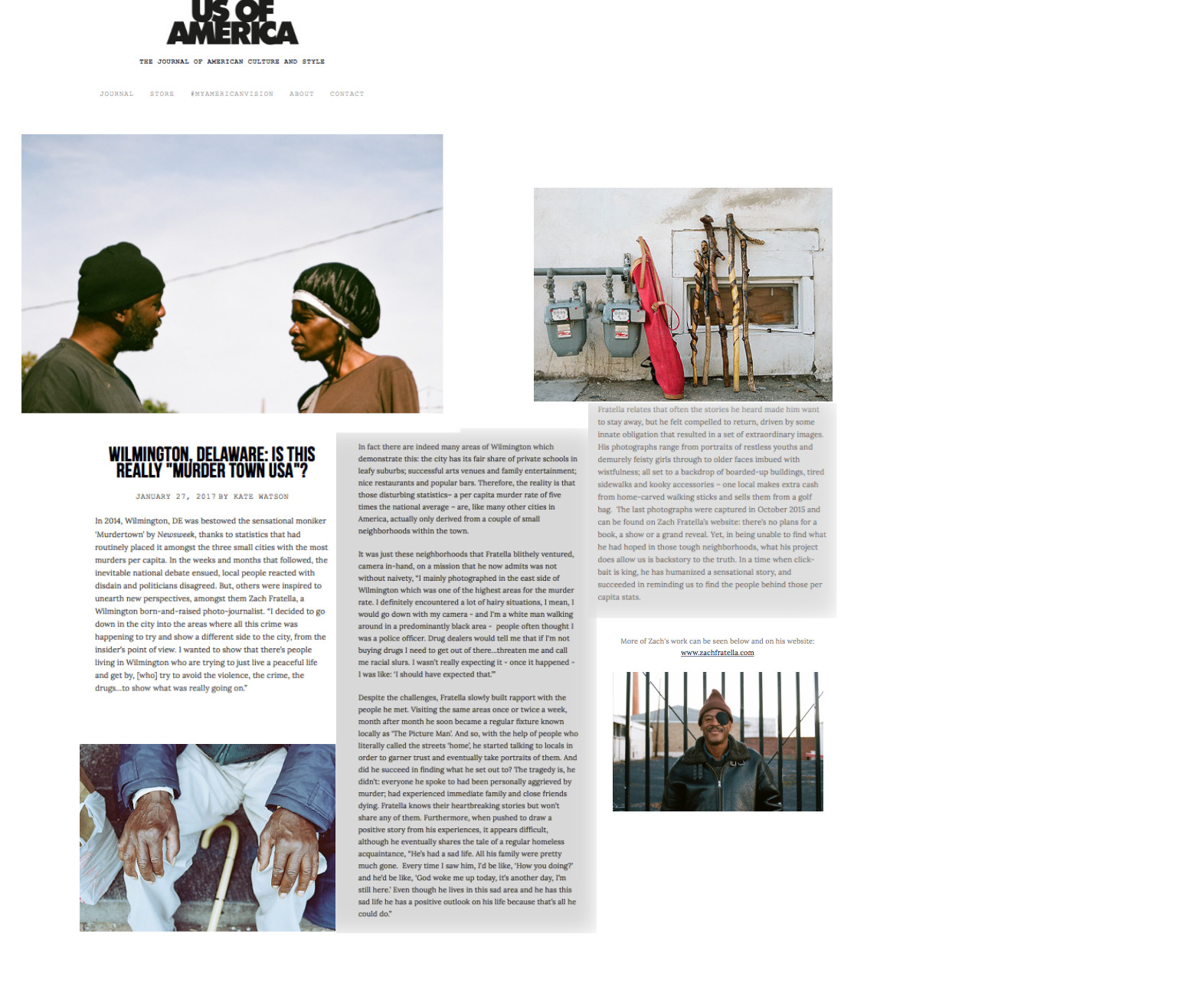Murdertown
Us of America magazine: murdertown. feature

Murder Town - words close-up
In 2014, Wilmington, DE was bestowed the sensational moniker ‘Murdertown’ by Newsweek, thanks to statistics that had routinely placed it amongst the three small cities with the most murders per capita. In the weeks and months that followed, the inevitable national debate ensued, local people reacted with disdain and politicians disagreed. But, others were inspired to unearth new perspectives, amongst them Zach Fratella, a Wilmington born-and-raised photo-journalist. “I decided to go down in the city into the areas where all this crime was happening to try and show a different side to the city, from the insider’s point of view. I wanted to show that there’s people living in Wilmington who are trying to just live a peaceful life and get by, [who] try to avoid the violence, the crime, the drugs…to show what was really going on.”
In fact there are indeed many areas of Wilmington which demonstrate this: the city has its fair share of private schools in leafy suburbs; successful arts venues and family entertainment; nice restaurants and popular bars. Therefore, the reality is that those disturbing statistics– a per capita murder rate of five times the national average – are, like many other cities in America, actually only derived from a couple of small neighborhoods within the town.
It was just these neighborhoods that Fratella blithely ventured, camera in-hand, on a mission that he now admits was not without naivety, “I mainly photographed in the east side of Wilmington which was one of the highest areas for the murder rate. I definitely encountered a lot of hairy situations, I mean, I would go down with my camera - and I'm a white man walking around in a predominantly black area - people often thought I was a police officer. Drug dealers would tell me that if I'm not buying drugs I need to get out of there...threaten me and call me racial slurs. I wasn’t really expecting it - once it happened - I was like: ‘I should have expected that.’”
Despite the challenges, Fratella slowly built rapport with the people he met. Visiting the same areas once or twice a week, month after month he soon became a regular fixture known locally as ‘The Picture Man’. And so, with the help of people who literally called the streets ‘home’, he started talking to locals in order to garner trust and eventually take portraits of them. And did he succeed in finding what he set out to? The tragedy is, he didn’t: everyone he spoke to had been personally aggrieved by murder; had experienced immediate family and close friends dying. Fratella knows their heartbreaking stories but won’t share any of them. Furthermore, when pushed to draw a positive story from his experiences, it appears difficult, although he eventually shares the tale of a regular homeless acquaintance, “He’s had a sad life. All his family were pretty much gone. Every time I saw him, I'd be like, ‘How you doing?’ and he’d be like, ‘God woke me up today, it’s another day, I’m still here.’ Even though he lives in this sad area and he has this sad life he has a positive outlook on his life because that’s all he could do.”
Fratella relates that often the stories he heard made him want to stay away, but he felt compelled to return, driven by some innate obligation that resulted in a set of extraordinary images. His photographs range from portraits of restless youths and demurely feisty girls through to older faces imbued with wistfulness; all set to a backdrop of boarded-up buildings, tired sidewalks and kooky accessories – one local makes extra cash from home-carved walking sticks and sells them from a golf bag. The last photographs were captured in October 2015 and can be found on Zach Fratella’s website: there’s no plans for a book, a show or a grand reveal. Yet, in being unable to find what he had hoped in those tough neighborhoods, what his project does allow us is backstory to the truth. In a time when click-bait is king, he has humanized a sensational story, and succeeded in reminding us to find the people behind those per capita stats.